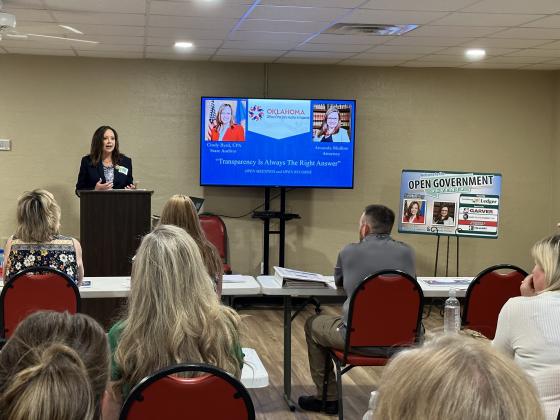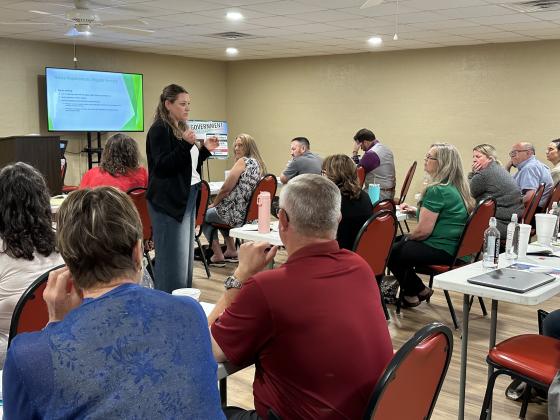ELGIN – Cities and counties can resolve many citizen complaints by simply producing the records citizens have requested, said State Auditor and Inspector Cindy Byrd.
“When an individual comes to my office, our protocol is to listen to their concerns,” she said. “And we will call up the city or county and say, ‘Hey, cough up these records or we’re going to come see you.’ And usually, that mitigates about 90% of the calls we get.”
Byrd teamed up with municipal attorney Amanda Mullins for a workshop hosted by Hilliary Media Group, the parent company of the newspaper, about Oklahoma’s Open Meeting and Open Records acts, which are designed to make government more transparent, May 24 at the Elgin Community Center. Sponsors for the event were the engineering services firm Garver, Ares State Armory, Johnson’s Plumbing, Hilliary, and Southwest Ledger.
Byrd heads the state auditor and inspector’s office, which audits the financial accounts of all government agencies in the state. The agency also conducts performance audits and special investigative audits upon requests by certain state officials or petitions from citizens.
Many investigative audits start with allegations that a city or county is hiding information from its citizens, Byrd said.
“The number-one reason why municipalities undergo an investigative audit is for violating the Open Meeting and Open Records acts,” she said. “That is the main reason citizens come to us.”
Byrd said even the perception that local government is concealing information from the public can trigger an investigation.
“The state auditor’s office often reminds all levels of government – every level – government officials are just stewards of the people’s checkbook, and the citizenry has a right to request and see that information,” she said.
Open Meetings Act
Mullins provided an overview of the Open Meetings Act, which generally requires governing bodies to conduct their business meetings in public.
“The purpose of the OMA is transparency – transparency in government,” she said.
Governing bodies include:
• City councils or county commissions.
• Boards that are partially or entirely supported by public funds.
• Boards that have the authority to spend taxpayer dollars or administer public property.
The law says a meeting occurs when a majority of the members of a governing body gets together – either in person or virtually – to discuss public business.
Mullins said governing bodies should not try to circumvent the requirements of the Open Meetings Act.
“The law favors transparency, and it requires strict compliance,” she said. “So do not try to look at that and think, ‘How can I maneuver this so there’s not a meeting?’ If that’s what you’re doing, that’s a violation.”
The law allows governing bodies to discuss certain topics in an executive session, which is not open to the public. Those topics include:
• Personnel matters involving individual salaried public officers or employees. This exemption does not apply to elected officials.
• Negotiations with employee unions.
• The purchase or appraisal of real property.
• Confidential communications between the governing body and its attorney.
• Matters where disclosing information would violate state or federal confidentiality requirements.
• Items related to terrorism.
• Economic development issues, including property transfers.
An executive session must be listed on the governing body’s agenda, which must cite the specific legal reason for discussing the topic behind closed doors.
A governing body should be careful about who is allowed to attend a closed session, especially if it involves confidential communications with the municipality’s attorney, Mullins said.
“The attorney-client privilege is waived if someone is in there that is not the client,” she said.
The governing body may not take action during a closed session, but it can act after reconvening in an open session.



